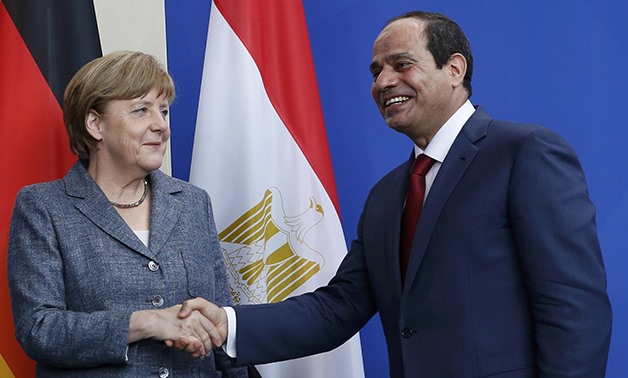
Sisi visiting Germany in 2015 - REUTERS - FABRIZIO BENSCH
CAIRO – 30 April 2017: A security cooperation agreement between Egypt and Germany is set to enter into force nearly a year after it was initially announced.
The agreement was signed between the Egyptian Minister of Interior Magdy Abdel Ghafar and his German counterpart, Thomas de Maiziére, in Berlin in July 2016. It was ratified by the Egyptian parliament in February 2017, and Germany’s Reichstag gave its final approval last Thursday.
According to the agreement, both Egypt and Germany shall cooperate for the purpose of “preventing and combating organized crimes, terrorism and all serious criminal offenses…to serve internal security in both countries.”
The agreement has been praised by Egyptian diplomats and parliamentarians, and is expected to be a big step forward in relations between Egypt and Germany and in Egypt’s battle against terrorism.
“Security cooperation agreement between Egypt and Germany is a quantum leap in relations between the two countries,” Egypt's ambassador to Germany Badr Abdel-Ati told Sada ElBalad. He clarified that the agreement tackles essential issues of mutual interest for both countries.
Alaa Abed, chairman the parliament’s Human Rights Committee, considered Germany’s ratification of the agreement a “big blow” to terrorism, especially the outlawed Muslim Brotherhood organization.
The whole world is now aware that Egypt is leading a successful war against terrorism and it is time for the international community to support Egypt in this war, Abed stated.
The Egyptian parliamentarian slammed a report issued by New York-based Human Rights Watch (HRW) urging the German parliament (Bundestag) to reject the agreement.
In its report, HWR stated that the agreement “could make German officials complicit in serious human rights violations [taking place in Egypt]” as it lacks provisions to secure human rights protection.
The Egypt-Germany security agreement specifies 22 fields in which Egyptian and German authorities should cooperate in investigations, share information about suspects, and carry out joint operations.
These fields of cooperation include the production and trade of counterfeit drugs, the manufacture of illegal weapons and illicit trafficking of arms, ammunition, explosives and fireworks as well as mediating prostitution and human trafficking, extortion and kidnapping of persons for ransom and production and distribution of counterfeit currency.
Theft of public and private property, corruption and fraud, cyber crimes, crimes against the environment and tax evasion are also included.
In terms of the designated fields, both Egyptian and German authorities are obliged to exchange experts, cooperate in the course of operational investigations through coordinated police measures, provide support in terms of staff, material and organization, and carry out joint measures to combat illicit activities.
Additionally, they shall share experience and information in particular on common methods of cross-border organized crime and special and new forms of committing crimes, cooperate in the field of forensic and criminological research and exchange findings as needed.
The agreement stresses the most on counterterrorism cooperation. “The Contracting Parties shall cooperate particularly in cases involving criminal or terrorist activities or preparations for criminal or terrorist activities in the territory of one of the Contracting Parties,” the agreement states.
Egypt and Germany discussed boosting counterterrorism collaboration on several occasions. Early 2017, Egyptian Minister of Foreign Affairs Sameh Shoukry held talks with Maiziére on means to boost bilateral cooperation in fighting terrorism.
The latter further highlighted “the efforts exerted by religious institutions, especially Al Azhar, to confront extremist thought,” according to a presidential statement.

Comments
Leave a Comment